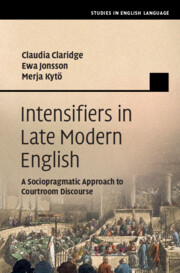Book contents
- Intensifiers in Late Modern English
- Studies in English Language
- Intensifiers in Late Modern English
- Copyright page
- Dedication
- Contents
- Figures
- Tables
- Acknowledgements
- Abbreviations and Notations
- Chapter 1 Introduction
- Chapter 2 Theoretical and Methodological Considerations
- Chapter 3 Intensifiers
- Chapter 4 Corpus Methodology and Overview of Data
- Chapter 5 Maximizers
- Chapter 6 Boosters
- Chapter 7 Downtoners
- Chapter 8 Multivariate Analysis
- Chapter 9 Intensifiers across Time
- Chapter 10 The Pragmatics of Intensifiers
- Chapter 11 The Sociolinguistics of Intensifiers
- Chapter 12 Conclusion
- Book part
- Bibliography
- Index
Chapter 6 - Boosters
Published online by Cambridge University Press: 15 March 2024
- Intensifiers in Late Modern English
- Studies in English Language
- Intensifiers in Late Modern English
- Copyright page
- Dedication
- Contents
- Figures
- Tables
- Acknowledgements
- Abbreviations and Notations
- Chapter 1 Introduction
- Chapter 2 Theoretical and Methodological Considerations
- Chapter 3 Intensifiers
- Chapter 4 Corpus Methodology and Overview of Data
- Chapter 5 Maximizers
- Chapter 6 Boosters
- Chapter 7 Downtoners
- Chapter 8 Multivariate Analysis
- Chapter 9 Intensifiers across Time
- Chapter 10 The Pragmatics of Intensifiers
- Chapter 11 The Sociolinguistics of Intensifiers
- Chapter 12 Conclusion
- Book part
- Bibliography
- Index
Summary
The boosters found in the Old Bailey Corpus (1720–1913) are documented in this chapter, with regard to their overall frequency distributions and usage patterns. This includes an overview of the entire inventory of 44 types and 47,613 tokens, which makes it the largest intensifier group in the data. Very is found to dominate the data, followed by far less frequent so and greatly as well as many fairly low-frequency items. Semantically, boosters are subdivided into originally quantitative (denoting amount: greatly, extent: widely) and qualitative types (e.g., denoting truth: very, perception: strikingly or evaluation: badly). Formally, the two most frequent types are unmarked adverbs (very, so); two other boosters prefer the suffixless form to a large extent (great, wide). The targets modified by boosters are mostly adjectives, followed by adverbs, while verbs and prepositional phrases are rare.
Keywords
- Type
- Chapter
- Information
- Intensifiers in Late Modern EnglishA Sociopragmatic Approach to Courtroom Discourse, pp. 120 - 162Publisher: Cambridge University PressPrint publication year: 2024

